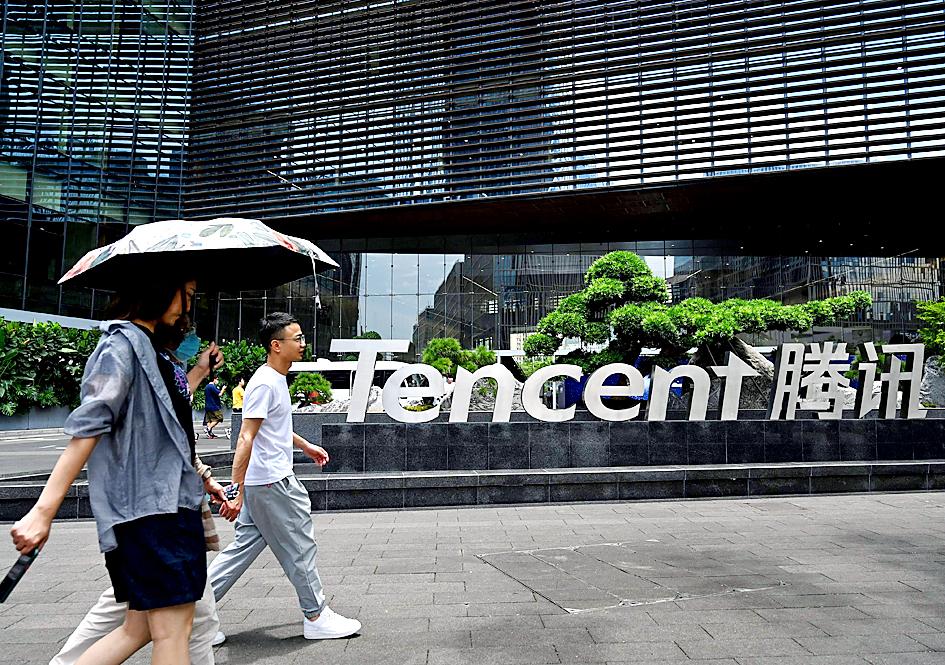Chinese regulators summoned gaming companies including Tencent Holdings Ltd (騰訊) and Netease Inc (網易) to discuss further oversight of the industry and the need to de-emphasize profits, prompting a steep share selloff.
Tencent, the country’s largest gaming company, dived as much as 6.7 percent, on track for its biggest fall since July, while smaller rival Netease fell as much as 7.7 percent.
The Publicity Department of the Chinese Communist Party’s Central Committee, the National Press and Publication Administration, along with two other agencies, called the meeting to convey plans to step up supervision and start checks on illegal behavior, Xinhua news agency said.

Photo: AFP
The government last week released new regulations for the industry, including limiting the amount of time children can play video games to three hours a week.
The agencies told the companies they must enforce the new regulations and break from “the solitary focus of pursuing profit” to prevent minors from becoming addicted to games.
They should also remove “obscene and violent content” and avoid “unhealthy tendencies, such as money-worship and effeminacy.”
“The authorities ordered the enterprises and platforms to tighten examination of the contents of their games,” Xinhua said. “The platforms must also resist unfair competition to prevent excessive market concentration or even monopolies in the industry.”
Chinese gaming stocks listed in the US tumbled with Bilibili Inc sliding 5.9 percent. The NASDAQ Golden Dragon China Index slumped 3.3 percent.
Netease said in a statement that it would comply with anti-addiction regulations and promote more quality games for minors.
“We believe in healthy game play and take very seriously the physical and mental health of minors,” Tencent said in a statement. “We appreciate the guidance and instruction from the relevant regulators, and will work hard to be in full compliance with all rules relating to youth game addiction and content regulation.”
The South China Morning Post has further reported that Chinese regulators plan to temporarily freeze approvals for all new online games, contributing to the major hit to Tencent and Netease.
However, Xinhua made no mention of suspending gaming approvals in its reports.
China in 2018 froze approvals on game monetization licenses for months, in part to combat addiction and myopia among children.
That spurred Tencent’s first profit drop in at least a decade and helped wipe about US$200 billion off its market value at one point.

China’s Huawei Technologies Co (華為) plans to start mass-producing its most advanced artificial intelligence (AI) chip in the first quarter of next year, even as it struggles to make enough chips due to US restrictions, two people familiar with the matter said. The telecoms conglomerate has sent samples of the Ascend 910C — its newest chip, meant to rival those made by US chipmaker Nvidia Corp — to some technology firms and started taking orders, the sources told Reuters. The 910C is being made by top Chinese contract chipmaker Semiconductor Manufacturing International Corp (SMIC, 中芯) on its N+2 process, but a lack

NVIDIA PLATFORM: Hon Hai’s Mexican facility is to begin production early next year and a Taiwan site is to enter production next month, Nvidia wrote on its blog Hon Hai Precision Industry Co (鴻海精密), the world’s biggest electronics manufacturer, yesterday said it is expanding production capacity of artificial intelligence (AI) servers based on Nvidia Corp’s Blackwell chips in Taiwan, the US and Mexico to cope with rising demand. Hon Hai’s new AI-enabled factories are to use Nvidia’s Omnivores platform to create 3D digital twins to plan and simulate automated production lines at a factory in Hsinchu, the company said in a statement. Nvidia’s Omnivores platform is for developing industrial AI simulation applications and helps bring facilities online faster. Hon Hai’s Mexican facility is to begin production early next year and the

TECH BOOST: New TSMC wafer fabs in Arizona are to dramatically improve US advanced chip production, a report by market research firm TrendForce said With Taiwan Semiconductor Manufacturing Co (TSMC, 台積電) pouring large funds into Arizona, the US is expected to see an improvement in its status to become the second-largest maker of advanced semiconductors in 2027, Taipei-based market researcher TrendForce Corp (集邦科技) said in a report last week. TrendForce estimates the US would account for a 21 percent share in the global advanced integrated circuit (IC) production market by 2027, sharply up from the current 9 percent, as TSMC is investing US$65 billion to build three wafer fabs in Arizona, the report said. TrendForce defined the advanced chipmaking processes as the 7-nanometer process or more

Who would not want a social media audience that grows without new content? During the three years she paused production of her short do-it-yourself (DIY) farmer’s lifestyle videos, Chinese vlogger Li Ziqi (李子柒), 34, has seen her YouTube subscribers increase to 20.2 million from about 14 million. While YouTube is banned in China, her fan base there — although not the size of YouTube’s MrBeast, who has 330 million subscribers — is close to 100 million across the country’s social media platforms Douyin (抖音), Sina Weibo (新浪微博) and Xiaohongshu (小紅書). When Li finally released new videos last week — ending what has